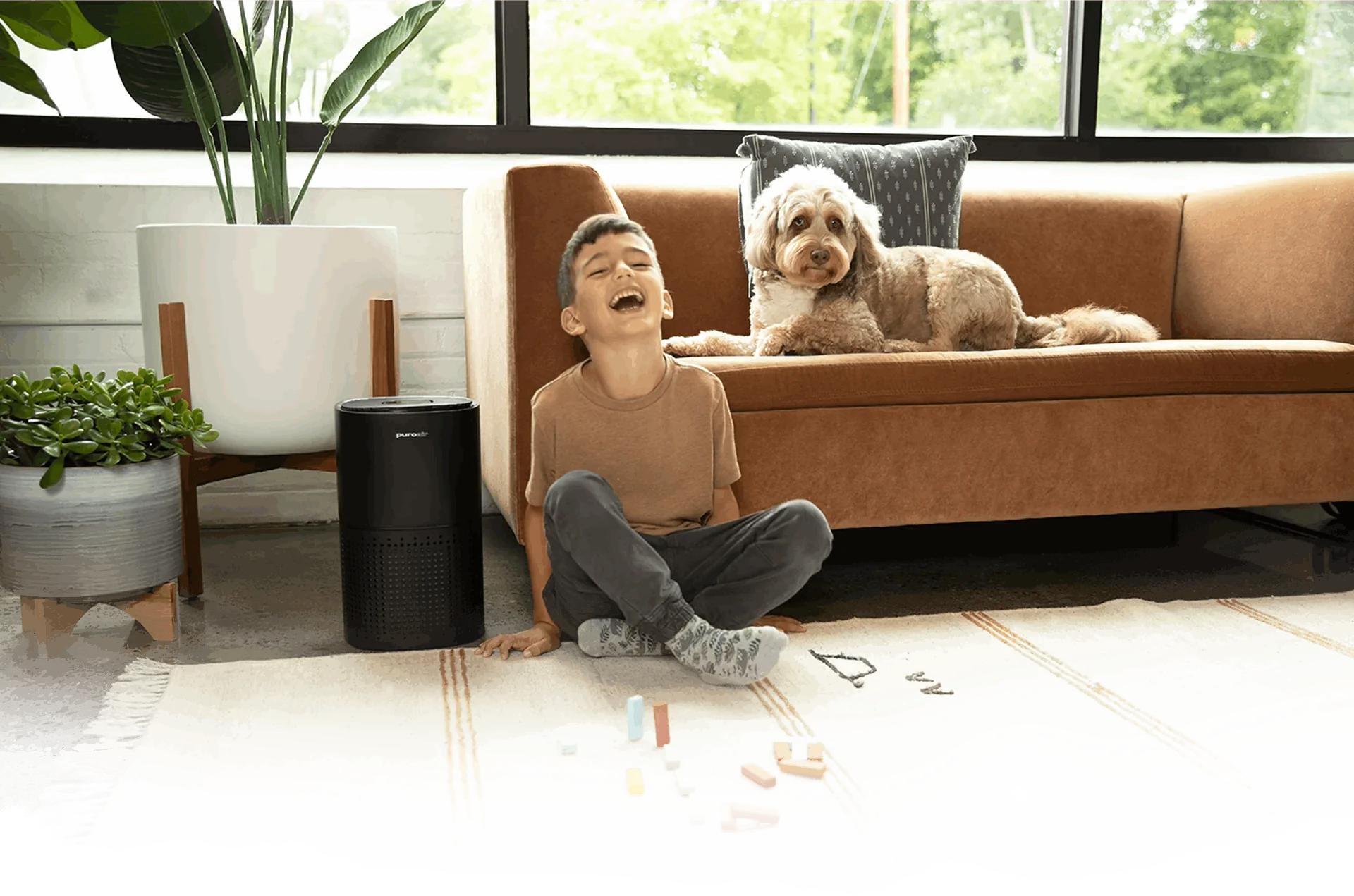Allergies are a common ailment affecting millions of people worldwide. Whether triggered by pollen, dust mites, pet dander, or mold spores, allergy symptoms can significantly reduce the quality of life. In the search for relief, many individuals consider using either a humidifier or an air purifier. Both devices offer benefits, but which one is more effective for combating allergies?
This article dives deep into the specifics of each device, discussing their features, functions, and effectiveness for allergy sufferers.
Understanding Allergies: The Culprits in the Air
Before evaluating the pros and cons of humidifiers and air purifiers, it’s crucial to understand the types of allergens and how they affect your health. The most common airborne allergens include:
- Pollen: Tiny grains released by plants that can cause hay fever.
- Dust mites: Microscopic organisms that thrive in household dust, contributing to allergy symptoms.
- Pet dander: Dead skin cells shed by pets, which become airborne.
- Mold spores: Fungal spores that grow in damp environments and circulate in the air.
Allergies occur when your immune system reacts to these typically harmless substances as if they are dangerous invaders. This leads to symptoms such as sneezing, runny nose, itchy eyes, and even respiratory issues. Managing your home environment is key to controlling allergy symptoms, and that’s where air quality devices like humidifiers and air purifiers come into play.
What Does a Humidifier Do?
A humidifier is a device designed to add moisture to the air, raising the humidity level. There are several types of humidifiers:
- Cool-mist humidifiers: These use a fan or ultrasonic vibrations to disperse cool mist into the air.
- Warm-mist humidifiers: These heat water to create steam that is then released into the environment.
- Evaporative humidifiers: These rely on a wick or filter to absorb water, which then evaporates into the air.
Humidifiers are most commonly used in winter when the air tends to be dry, causing discomfort to the skin and respiratory system. They are effective in preventing dry throat, irritated nasal passages, and even nosebleeds. But can they help with allergies?
Humidifiers for Allergies: Pros and Cons
Pros:
- Soothes irritated nasal passages: Dry air can exacerbate allergy symptoms by drying out the mucous membranes in your nose and throat. A humidifier helps to keep these passages moist, making it easier to breathe.
- Reduces the spread of allergens: Some allergens, like dust mites, thrive in dry conditions. Increasing humidity can prevent them from spreading as easily.
- Comfort for asthmatic symptoms: Asthma is often linked with allergies, and humid air can ease asthma-related breathing issues.
Cons:
- Too much humidity can worsen allergies: Excessive moisture in the air can create an ideal environment for mold and dust mites, both of which are common allergens. It’s essential to maintain an optimal humidity level (between 30-50%).
- Requires frequent cleaning: If not properly maintained, humidifiers can become breeding grounds for bacteria and mold, which can be dispersed into the air and exacerbate allergic reactions.
What Does an Air Purifier Do?
An air purifier is designed to remove contaminants from the air. There are different types of air purifiers based on their filtration technology:
- HEPA filters (High-Efficiency Particulate Air): These are capable of capturing 99.97% of particles as small as 0.3 microns, including pollen, dust, and pet dander.
- Activated carbon filters: These remove gases, odors, and volatile organic compounds (VOCs).
- Ionic air purifiers: These emit negative ions that bond with airborne particles, causing them to fall to the ground or stick to surfaces.
Unlike humidifiers, which add moisture to the air, air purifiers actively remove harmful particles, improving air quality.
Air Purifiers for Allergies: Pros and Cons

Pros:
- Effective removal of allergens: Air purifiers, especially those with HEPA filters, are highly effective at trapping allergens like pollen, dust mites, pet dander, and mold spores. This makes them particularly useful for allergy sufferers.
- Improves overall air quality: In addition to removing allergens, air purifiers can reduce exposure to pollutants like smoke and chemical vapors.
- Beneficial for pet owners: If you have pets, an air purifier can reduce airborne pet dander and help minimize allergic reactions.
Cons:
- Limited impact on humidity: Air purifiers do not affect the humidity level in a room, so if dry air is contributing to your allergy symptoms, this device alone may not provide complete relief.
- Regular filter replacement: To maintain effectiveness, air purifiers require regular filter changes, which can be costly over time.
- Not effective for large particles: Larger allergens, like heavy dust or visible pet hair, may not be effectively captured by air purifiers.
Humidifier or Air Purifier: Which One Should You Choose for Allergies?
Now that we’ve explored the roles of both humidifiers and air purifiers, the question remains: which is better for managing allergies?
When to Choose a Humidifier
If your home tends to have very dry air, particularly in the winter months, and you experience symptoms like dry throat, nosebleeds, or irritated nasal passages, a humidifier might be a good solution. The added moisture can help keep your mucous membranes healthy, reducing the risk of allergic reactions. However, it’s important to monitor humidity levels carefully to avoid over-humidification, which can lead to mold growth and worsen your allergies.
Best for:
- People who live in dry climates.
- Those with allergies aggravated by dry air, such as dry throat and nasal passages.
- Individuals experiencing asthma symptoms that worsen in dry environments.
When to Choose an Air Purifier
If your primary concern is the presence of allergens in your home, such as pollen, pet dander, mold spores, or dust mites, an air purifier is the better option. PuroAir is a high-quality HEPA filter air purifier that can trap a large percentage of airborne particles, reducing your exposure to allergens. While it doesn’t add moisture to the air, it significantly improves air quality, which is crucial for allergy management.
Best for:
- People with allergies triggered by airborne particles.
- Pet owners who want to reduce pet dander in the air.
- Homes located in areas with high pollen counts or poor air quality.
Can You Use Both Devices Together?
For many allergy sufferers, the ideal solution may be to use both a humidifier and an air purifier together. Each device addresses a different aspect of indoor air quality:
- The humidifier keeps the air moist, preventing irritation of the mucous membranes.
- The air purifier filters out harmful allergens and pollutants from the air.
By using them together, you can achieve balanced air quality—moist air that is free from allergens. However, it’s essential to maintain both devices properly. Clean your humidifier regularly to prevent mold growth, and change your air purifier’s filters as needed.
Tips for Maximizing the Benefits of Both Devices
To get the most out of your humidifier and air purifier, follow these practical tips:
- Monitor humidity levels: Keep indoor humidity between 30-50%. You can use a hygrometer to measure the humidity in your home.
- Clean your devices regularly: Regular cleaning prevents the buildup of mold, bacteria, and other harmful particles in both humidifiers and air purifiers.
- Use in the right room: Position the devices in rooms where you spend the most time, like the bedroom or living room.
- Consider the size of the space: Ensure the devices you purchase are suitable for the size of the room where they will be used. Some humidifiers and air purifiers are designed for small spaces, while others can cover larger areas.
Conclusion: Finding the Best Solution for Your Allergies
Ultimately, whether a humidifier or an air purifier is better for your allergies depends on your specific needs and environment. If dry air worsens your symptoms, a humidifier can provide much-needed moisture. On the other hand, if airborne particles like pollen and pet dander are your primary triggers, an air purifier is the superior option.
For the best results, consider using both devices to create an optimal indoor environment that promotes better health and reduces the impact of allergens on your daily life.





